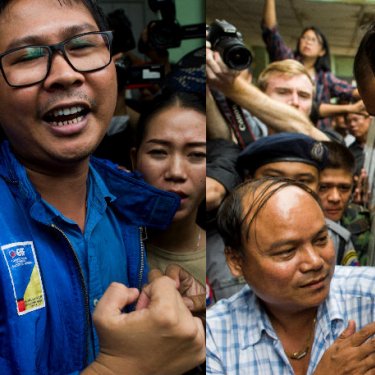RSF urges Myanmar to free two Reuters reporters

Reporters Without Borders (RSF) reiterates its call for the immediate release of two Burmese reporters working for the Reuters news agency who appeared in court again in Yangon on Wednesday, when they were formally charged with breaching a colonial-era secrecy law.
Wa Lone and Kyaw Soe Oo have been held since 12 December, when they were arrested immediately after being handed documents by two mysterious policemen they met in a Yangon restaurant. The police later announced that they were “arrested for possessing important and secret government documents related to Rakhine State and security forces.”
They are currently facing up to 14 years in prison under Myanmar’s Official Secrets Act, a 1923 law that is rarely used except to make the media understand that the military do not want to be the subject of investigative reporting. It was last used against four journalists in 2014. The pair will return to court on January 23 for legal arguments.
“None of the claims made by the authorities in this case seems to be credible,” said Daniel Bastard, the head of RSF’s Asia-Pacific desk. “The two journalists had the misfortune to take an interest in what is happening in Rakhine State, where 650,000 members of the Rohingya community have fled to neighbouring Bangladesh to escape the army’s operations.
“What with the lack of transparency, the failure to respect proper legal procedure and the fabrication of evidence, everything suggests that Wa Lone and Kyaw Soe Oo are being used by the authorities as scapegoats in order to deter overly curious reporters.”
The authorities said that the two policemen who gave the reporters the documents were also arrested under the Official Secrets Act at the same time. But the two reporters say the detained police officers were not the ones who gave them the documents. The authorities have not explained this glaring inconsistency.
Ever since the Rohingya refugee exodus began in late August, journalists have been systematically denied access to the region, an issue that RSF raised with Myanmar’s leader, Aung San Suu Kyi, in September.
In an extremely troubled situation that may have involved “elements of genocide,” according to the United Nations, it is essential that journalists should be able to go there and document what is happening. And now they should above all be free to cover implementation of the accord signed between Bangladesh and Myanmar on 23 November for the repatriation of Rohingya refugees, which is supposed to begin on 23 January.
Myanmar continues to languish in the bottom third of RSF’s World Press Freedom Index and is currently ranked 131st out of 180 countries.



